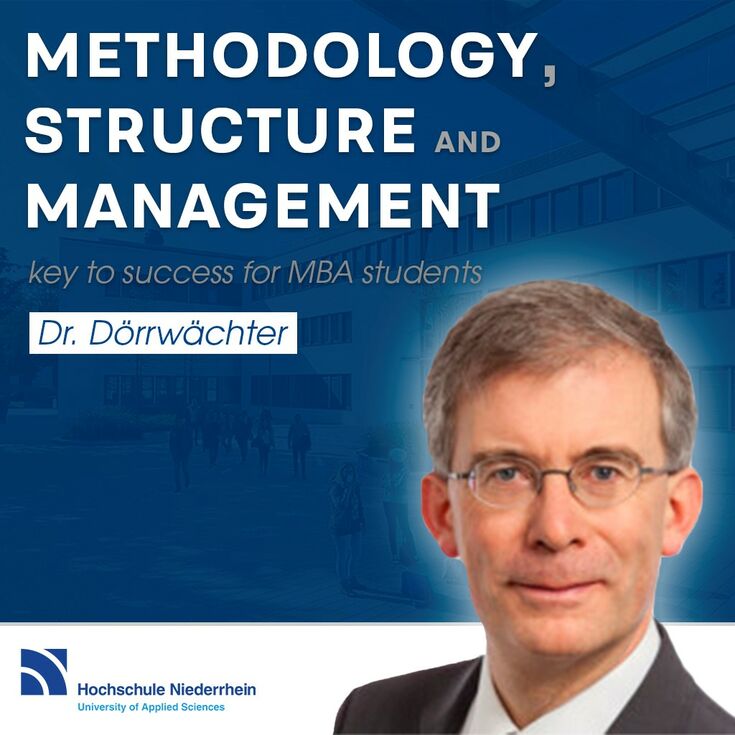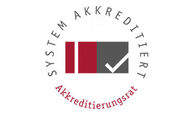Wir hatten kürzlich Gelegenheit, Herrn Dr. Dörrwächter, einen Dozenten im berufsbegleitenden MBA-Programm „Leadership & Management“ der Hochschule Niederrhein, zu interviewen. Da sein Modul "Organization and Human Resource Management" auf Englisch unterrichtet wird, wurde das Interview ebenfalls in englischer Sprache geführt. Er verrät, was das MBA-Programm einzigartig macht und wie Studierende erfolgreich studieren können:
Question 1: What key skills do you believe MBA students should develop?
In our MBA program, I believe that students should primarily develop methodological skills. These skills will enable them to find solutions to problems that cannot be solved through conventional means. Methodology is more important to me than just memorizing knowledge.
The second important skill is the ability to structure their work, thinking, and approach to new problems.
As a third crucial skill – and I'm talking about a skill, not just knowledge – I would highlight the ability to manage teams or specific topics within a company.
A fourth skill would, of course, be to further improve their proficiency in English, as this MBA is conducted in English.
Question 2: How important is it for students to study 30% of the program in English?
It's good that you brought this up. I can tell you why I think this is extremely important: achieving a sufficient proficiency level in English is absolutely necessary today. Even if you're working in a local company, you usually come across people with whom you can only communicate in English. If you were not able to speak English, this would be very difficult for you, especially if you later work in a managerial position. There, you need to speak English because you will always meet someone who doesn't speak German.
For a deeper dive into Dr. Dörrwächter’s experiences and insights, visit our university's website.
Question 3: How do you integrate modern business trends and technologies into the studies or the curriculum?
I regularly review my lecture script and add current trends and topics. For example, I recently added an entire chapter on digitization in HR. I also encourage my students to incorporate these trends and developments into their final presentations. In this module, students must give a final presentation on a topic of their choice, but it must be an HR topic. I also try to integrate business developments and current trends into the case studies, both in the problems presented and in their solutions.
Question 4: What unique features of the MBA program set it apart from others?
I think one big advantage of this MBA program is that it is not only theoretical but also highly oriented towards practical application. In my lectures, I try to adhere to this principle in three ways: First, in my core lectures, I always try to provide very practical examples from my own experience as an HR professional and executive in various companies or from my consulting experience in HR.
Secondly, we have two case studies that are very important and constitute a significant part of this lecture. These case studies are entirely focused on the practical application of HR methodology and tools. The goal is to apply what has been learned to real-life cases that I've encountered.
Thirdly, I encourage my students to include not only a theoretical description of their topic in their final presentations but also to discuss the practical relevance of the topic by providing real-life examples. For instance, they are asked to explain how talent management works in their own company or how AI can be practically applied in HR. I think this is a big advantage compared to other MBA programs.
Question 5: Is there anything specific you would like to add that you particularly like about this program?
There are two things that I really like and that motivate me. One is working with people who are already professionals. They have a different approach to problems, and they are generally more structured in their work, which makes collaboration easier. They are also highly motivated because anyone who comes here and pursues an MBA in addition to their job is making a significant effort in terms of time and concentration.
Another highlight is seeing how former students advance in their careers. Just this week, I met a former student who is now in an executive position at a bank and has really made a career for himself. It's very motivating to see how people who have completed this MBA use the skills they have learned here to shape and develop their own careers.
I can only recommend this program. I have been a lecturer in this module for over seven years now, and I think it has been a great success. It is also very rewarding for me as a lecturer to see how students develop their master's thesis in HR and how they grow their skills. I am thoroughly convinced of the concept of this MBA program.


















